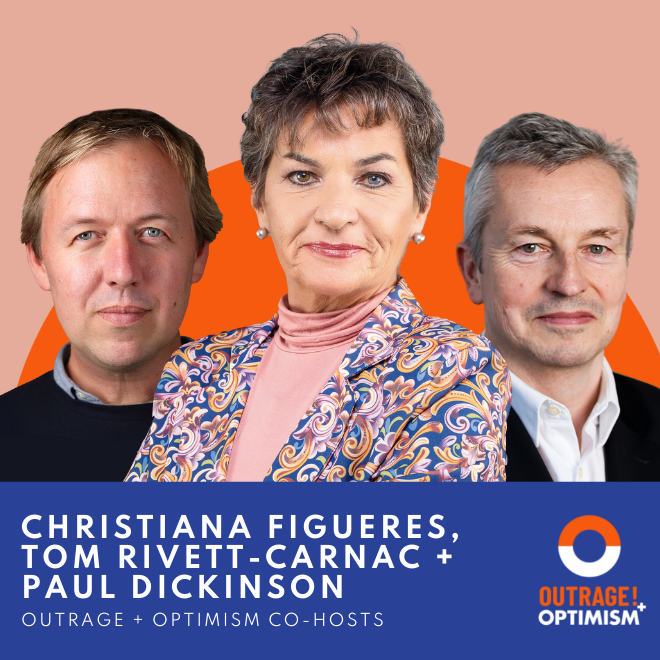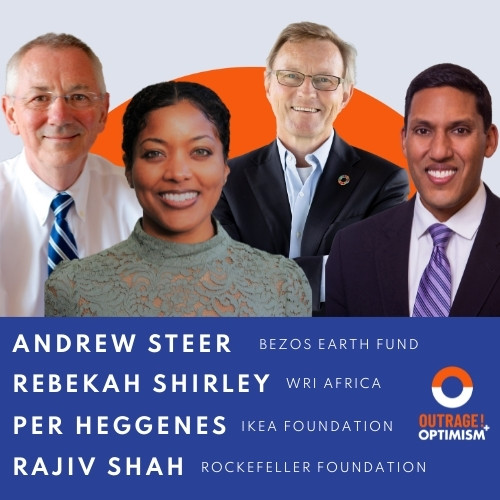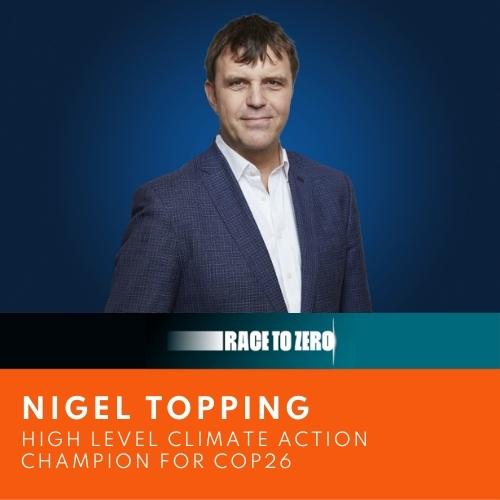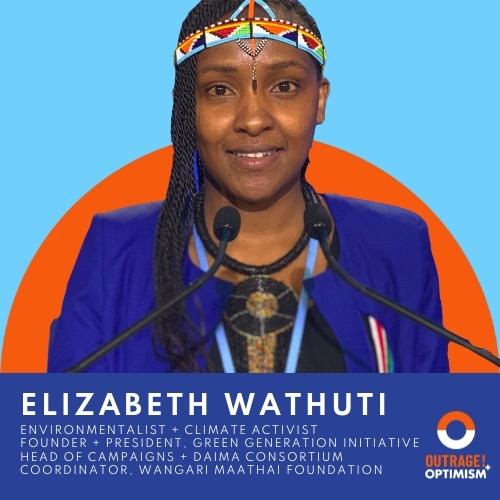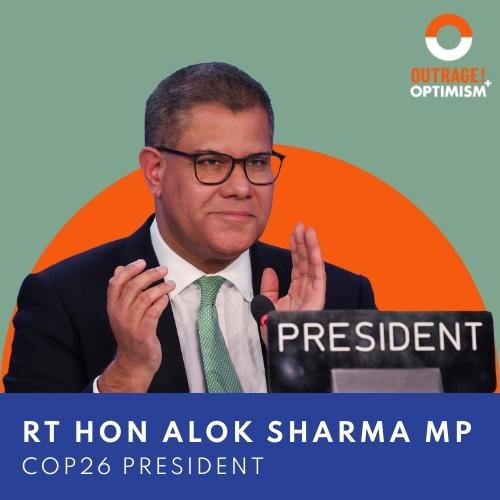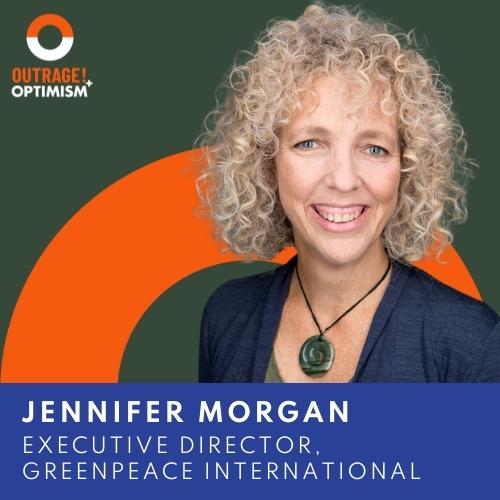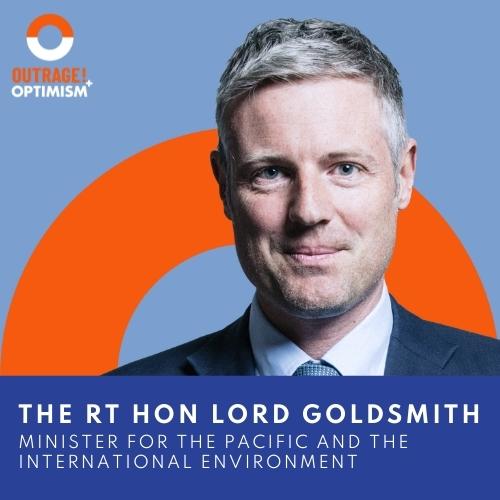133: Innovative Finance To Fast-Forward Climate Solutions with Hiro Mizuno
Why the sudden wake-up in climate finance? Is it enough to address the climate crisis?
About this episode
COP26 saw announcement after announcement from the financial sector, but we have questions. First off, why the sudden wake-up? What will follow? And, critically, will it be enough to address the climate crisis?
Here to help us make sense of the fast-moving developments is Hiro Mizuno, Special Envoy of U.N Secretary-General on Innovative Finance and Sustainable Investments. Hiro shares his deep insights into the financial landscape since the shift towards recognition of the systemic risk posed by the climate crisis.
Reaching back to the Industrial Revolution, Hiro talks us through the role of the finance industry in accelerating change. Financial institutions’ competitive nature may well drive their transition to net-zero business models and portfolios – but it’ll be the next twelve months that prove the worth of the COP26 announcements, Hiro reminds us.
Covering regulation, GFANZ, public trust, carbon pricing, and much more, this is a wide-ranging conversation not to be missed.
Watch
Full Transcript
Transcript generated by AI. While we aim for accuracy, errors may still occur. Please refer to the episode’s audio for the definitive version
Tom: [00:00:00] Hi, everyone, so recently on Outrage + Optimism, listeners will be aware that we have been bringing you a series of conversations to break down what happened at Cop 26 from different angles. We've talked to activists, we've talked to politicians and a range of others. And today we wanted to bring you a perspective from somebody who is deeply immersed in the world of finance to comment, not only on where this issue is large in the world right now, but specifically what came out of the cop. And we could not have anyone better than Hiro Mizuno. Antonio Guterres, the U.N. Secretary General, appointed Hiro Mizuno as Special Envoy on Innovative Finance and Sustainable Investments in December 2020. He has been in this world for an enormous amount of time. He used to be Executive Management Director and Chief Investment Officer of the Government Pension Investment Fund of Japan, which is one of the largest asset owners in the world. I'm going to pass you over now to Christiana. Christiana and Paul hosted this conversation with Hiro just a couple of days ago. She further introduces him right at the beginning of the conversation, so I will leave you in her capable hands. But just to say that we'll be back as ever this week on Thursday with a conversation with Jennifer Morgan, Executive Director of Greenpeace International. But for now, please enjoy the special conversation with Hiro Mizuno.
Load MoreChristiana: [00:01:18] Hiro Mizuno, thank you so much for joining us here on outrage and optimism for those who don't know you yet. The Secretary General, Antonio Guterres named you Special Envoy on Innovative Finance and Sustainable Investments at the end of last year, with the role to support the Secretary General's advocacy and engagement to encourage private investments and public shifting of capital towards an area that is larger than climate change. Towards the broader 20 30 agenda and all of the Sustainable Development Goals. So thank you for the work that you've been doing on that broader agenda for the past year. But if you don't mind, we wanted to focus this conversation on the support that you have been giving not only to the secretary general, but to the whole process of shifting finance toward climate goals. So if you don't mind, that's what we would like to focus on. And to start here we are coming out just a few weeks after COP26. My sense Hiro, but I would love to hear from your perspective, my sense is that if there was a sector who all of a sudden had a huge awakening about the risks of miss-investing into high carbon assets and the need to shift over to lower or no carbon assets, it was the financial sector I have never seen as a dramatic shift as the financial sector. And in fact, I would say announcement after announcement, commitment after commitment over the past 12 months. But then, of course, culminating in COP26. Is that your impression? Also that there was what I would almost call a sudden wake up in the financial sector and then culminated at COP26? And if that is your observation, why do you think they all of a sudden woke up?
Hiro Mizuno: [00:03:29] So Christiana? Thanks for having me. It's my honour to work with you at the COP26 and then joining this, you know, the podcast session. I'm really, you know, the encouraged and always inspired by your leadership on the climate agenda. So thanks again for having me. So let me try to answer your question from my perspective, because I grew up in this industry for decades and before I, you know, the accepted the Secretary-General appointment I used to run the the Japanese Government Pension Investment Fund, which was the the, you know, the largest pension fund in the world with one point five or seven trillion dollars. And then throughout my time there,
Christiana: [00:04:22] Which is when I met you, Hiro, I visited you in your office when you were in that role. That's when we first met. So I remember that clearly.
Hiro Mizuno: [00:04:31] Absolutely. And then when I, you know, the the joined the GPF as an Investment Chief in 2015, it already, the discussion about ESG already because the PRI, Principal Responsible Investment was established by Kofi Annan several years ago, and then people started talking about ESG. But just to share my experience, I mean. During the first two years of my advocacy as the investment chief of the Government Pension Fund, quite often I was called as a sort of a religious leader or environmental activist instead of like, you know, the financial professional who cares about the sustainability of the whole capital market. So it's not all of the sudden happen, but the, you know, from my perspective, over the last five or six years, there is a sort of gradual shift in, you know, the financial professionals perception on environmental issues, particularly in a climate. And the first it started almost sounds like, you know, the an environmental activism or like a social responsibility debate across the financial sector. But throughout out of the time there are two things became more clear and more widely accepted within industry. One is climate change is really causing systemic risk to our financial system. And you know that my peer Special Envoy Mark Carney started as the governor of the Bank of England, calling it the systemic risk, but it took us several years to really digest what it means. So the risk, you know, the the aspects of the climate change in terms of the financial system or more specifically, the carbon heavy industry or carbon heavy infrastructure became well understood. So there are two things like exactly the same as like, you know, when the iPhone was introduced at two thousand seven, it's not only because Steve Jobs came up with that idea, but the chips and the system was available to make it happen. So I always I think that it's the same thing happens here. Because the five years of a gradual change in a shift in the, you know, the mindset of the financial professional and the IPCC reports came to to our attention that we really need to take an action right now and the possible damage caused by the the scenario, you know, we don't want to see is going to really impact, you know, the financial portfolio. So those things came together this year. And also at the same time, you know, the that we have been talking about, that we need that disclosure, we need the tools and the those kind of things. And some of them started blooming. So I think it's just not really happened all of a sudden. It just kind of like we are creating a momentum. And this year, all of the factors came into the place so that the, you know, the financial leadership was feeling comfortable to commit such a year to such a broad, you know, the bold and ambitious goals.
Christiana: [00:07:57] Now that's a very good point that it didn't happen all of a sudden, I guess from my perspective, and I'm outside of your sector Hiro. But from my perspective, what actually happened this year is that we got to critical mass. So I would definitely agree with you that for four years, in fact, ever since I was with you in your office, you and a few others have been shining lights on, how do we shift finance over to ESG, Environmental, Social and Governance issues? But it did seem to me that in the past it has been a few shining lights, brightly shining lights. But this year we got to critical mass and that is very exciting. And as you say, the, you know, all of the parts that needed to go into this shift were now available. And the critical mass that we saw at COP26, I would say, is embedded into this GFANZ, which is a I don't know, Mark Carney loves the acronym. I'm not sure that I'm in love with it yet, but is the Glasgow Financial Alliance for Net Zero and it is forty five institutions,
Hiro Mizuno: [00:09:11] Four hundred and fifty institutions
Christiana: [00:09:11] Thank you. Four hundred and fifty in forty five countries, yes. Four hundred and fifty institutions in forty five countries that together manage one hundred and thirty trillion dollars and that under this GFANZ umbrella, it brings together alliances that had already evolved but now are coming together into this commitment to shift their portfolios to net zero by 2050. Really a pretty astonishing critical mass that has now come on board. Now here is the question Hiro, because we all know that the financing of this shift in technologies is in the way we, in fact, even structure our financial system has to occur most urgently in developing countries. A, because that's where emissions in the future are going to come from. B, because they need more support than those who operate in the space of the industrialized countries. And I have it, but please correct me if I'm wrong, that only 10 percent of those one hundred and thirty trillion dollars are actually allocated to developing countries or to investment opportunities in developing countries. So that stands as one reality in one bucket, and it obeys many different, very good reasons. But in the other bucket stands the reality that the U.N. estimates that what we actually need for the transition in those developing countries is more like two thirds of the total of one hundred and fifty trillion dollars that is needed for the transition. So how do we bridge that huge gap and how do we bring down the risk of investments into opportunities that are emerging in developing countries?
Hiro Mizuno: [00:11:15] Sure. Let me stick back the, you know, the put in my perspective on the GFANZ or Glasgow Financial Alliance for net zero. Now it's called the Global Financial Alliance for net zero after COP. One of the biggest achievement of that is due to that critical mass, the people in the financial sector or the people acting in the capital market of financial market now feels that this is a consensus that this is a base case scenario for them to analyze their investment of financing opportunities. So just like a 10-12 months ago, if I talk to any financial sector analyst or like a people working in a capital market, what do you use as a base case scenario and how do you compare your opportunity or risk against those scenarios? I would have said like, you know, the 80-90 percent of analysts said like, Oh, well, we still don't believe in a two point zero degree scenario. So now I think the GFANZ is announcing like, you know, we are going to use one point five degrees in a transition or like a pathway as our base case scenario.
Christiana: [00:12:31] Wait Hiro. Can you say that once again, sorry, can you say that because you've just said something that is hugely important. Are you saying that these four hundred and fifty institutions managing one hundred and thirty trillion have actually formally committed to a ceiling to their financial transactions, contributing to a ceiling of one point five versus two degrees? Did you just say that?
Hiro Mizuno: [00:12:56] Yeah, because the net zero requires at one point five degree, you know, the the goal, right? So I think that when they say we commit to net zero by 2050, that means that they are committing to a one point five degrees scenario. But the reason why I think that kind of consensus is very critical is just two years ago, I gathered with the global, you know, the CEOs and global financial sector leaders. And I asked them a question after two days of a discussion on how we can integrate the ESG climate change in our businesses. And then I asked first that do you believe we need to achieve one point five degree? And everybody said yes. And then I followed up with a question like, you know, do you think we are capable of achieving it? And, you know, unanimously answer was yes.
Christiana: [00:13:50] Wow. Wow Hiro.
Hiro Mizuno: [00:14:56] Then I wound up with my last question which is, do you think it's going to happen? And very few hands raised. So that means, they knew we need to make it happen and we are capable of doing it, but we don't believe that's going to happen, right? So we just need to change that perception.
Christiana: [00:14:15] Yeah, yeah. So what is the gap there?
Hiro Mizuno: [00:14:19] The gap there is like basically people who think they can, they can achieve it, but they don't think the other people try to achieve it. So it is just like I call it the vacuum of responsibility. Right. So now I think the other, if that critical mass of the financial leadership says we are committed to make the business aligned with one point five degree scenario, I am hoping that the people working in financial industry now believe, OK, now that's going to be the best case scenario for us to use for our daily financial analysis and financial decision making. So that's for me, the biggest achievement of GFANZ. But on the other hand, you know, the 130 trillion dollars sounds like, you know, the very big number, and we always need that kind of like, you know, the catchy headline and sometimes people think like the Mark Carney said they want a thirty trillion dollar is available of climate finance, which is a little bit overstatement because they just aggregate the asset under management by those financial institutions sign up to the GFANZ. And how much of them it's actually ready to accelerate the transitions that signed up to the transition to a sustainable energy, society and economy, it’s not very clear. So we just need to make sure that we totally align the portfolio with the net zero scenario. At the same time, we need to invest more in the acceleration of transition. So we need to take the money out of the carbon heavy industry if they don't show their will to transform their business model and to put the money behind the people who bring in innovation or to push their transformation much quicker. But you know the inconvenient truth of that is we need to take the money out of somewhere to put that in the area we need. So that's the challenge which hasn't been addressed yet. And last but not the least, is exactly the point you pointed out. Two thirds of that money have to go into developing countries, and there is no scheme that enables that at the moment. So for example, let me tell you something like, you know, asset managers, whatever they say about the net zero commitment, they cannot put the money in emerging markets unless their clients allow them to do it. And on top of that, the most of the asset manager uses index like SP500 or FTSE and MSCI, those kind of things to evaluate their own performance. So unless those index has to start in the emerging market, they cannot shift the money into emerging market. So there are a lot of things like credit rating agencies and other thing like, you know, most of the other countries who need the money for transition, they are not even rated. They are like a treasury bond. So we just need to work more closely. And the GFANZ is still the alliance of the those silos. They are trying to solve their own problem. But there's so much interdependence in the financial system, so we start more intersectoral conversation within the financial industry. Financial market. And without that, I mean, we really cannot shift the market into that direction. To put more money into emerging markets. We talk a lot about how to create a green project and how to create the pathway to those like a particular sector in the developing countries. But my argument is, you know, we have made a lot of effort, you know, working together with MDB or a Multi Development Bank or developing agency to create the last one mile of the financial investment into those green or sustainable infrastructure, for example. But we haven't come up with a solution how to open the faucet to flow that water or the capital into that destination. So I think there's still a mismatch, and I hope that the Global Financial Alliance can really tackle that, but it's more systemic. The issue we need to address at the same time, we definitely need to think about what kind of the last one mile financing scheme we can come up with, but it requires a lot of more creative thinking and a lot of more sort of candid conversation because it sounds sometimes a bit hypocritical. One financial person after the other talking about what they can do without the asking the other the actor or actress in a financial market to change their way of business.
Paul: [00:19:22] So Hiro can I ask a slightly technical question. You talked about this credit rating, and clearly it's important that markets that don't have very good credit rating information get that. And that's something that I, you know, we have to hope the market comes forward with. But very specifically, we have, you know, many, many, many, many thousands of listeners and many of them work in financial institutions that are involved in GFANZ, but also many of them work in NGOs that are trying to raise awareness of the public regarding green investment opportunities or low carbon investment opportunities. So I'm just checking if I understand you correctly, you're saying that. It's actually now to fill this responsibility vacuum, which is a wonderful phrase, right to fill that we actually need employees of all the financial institutions around the world to start to use the authority of the GFANZ commitment to change investment behaviour. And we need the public people in pension funds to talk to their pension funds or their investment managers about how they want to have these products. Is that what you're saying?
Hiro Mizuno: [00:20:27] Yeah, I think we just need to talk to each other. I mean, they just, you know, none of the financial, the players, even the biggest asset manager or biggest pension fund. They cannot solve this problem by themselves, but they have been kind of like the shy or hesitant to ask the other people to change their practice so to enable them to do what they are trying to achieve. So I think the NGO is another thing like NGO, or if they raise awareness of the customer base because they are the financial institution, has the institutional as well as retail customers. And if that NGO will raise awareness among the retail investors or retail customer of the bank, banks feel like, well, they need to change their business practice. But that's something we need because each party, whether it's a finance, really a financial player or that the energy or the government, they need to step up to actually make the statement they commit, but to achieve what they are trying to achieve, they need the other people to do something differently from the what they are doing right now. So I think that kind of candid conversation is very important and NGO can be a trigger of that kind of conversation because they can actually raise awareness among the investors. You know, I used to run the biggest fund in the world, but I always tell the people who are just making their own personal investment. Talk to your banker or talk to your broker and ask them like, you know how you can make a more sustainable investment, how I can avoid, you know, the investing in the business who actually slow down the transition and that kind of a conversation if it happens everywhere. I think the people, you know, the system starts moving, but at this point of time, that kind of intersect, the between different actors' compensation has me really missing. That's what I'm trying to say.
Christiana: [00:22:35] If I understand what you're saying, Hiro, is you're saying under gee fans, what we have is a vast collection of silos and these are all of these separate institutions, all of which belong to different sub-sectors in the financial sector at large. But they're all still operating in their own silos. And the next step that we need is for all of them to understand that they're all heading in the same direction. Net zero by 2050. And that the only way that they're going to achieve that is actually by stepping out of their silos and beginning to communicate very directly with each other for the pieces of the puzzle that each of them have to put on the table.
Hiro: [00:23:26] Yeah.
Christiana: [00:23:27] Now if that is what you're saying, I am actually quite concerned hero, because that's going to take time. They're not used to operating like that, right? That is a very different, that's innovative thinking and innovative acting, let alone innovative finance. And so that makes me very concerned because as we came out of cop, I think one thing that was evident to everyone is that while there was jubilation and celebration of those inside, who were the government delegates, outside there is still a crisis of public trust. And we had, you know, speech from young people that said Vanessa Nakate, for example, said quite directly to the financial sector. She said, we don't believe that banks will suddenly put trillions of dollars on the table for climate action when rich countries have struggled since 2009 to raise a hundred billion for the world's most vulnerable countries. We don't believe that promises made by financial companies to end deforestation will actually prevent trees from being cut down. We simply don't believe it. And then she ended up by saying, I'm here to say, prove us wrong and God help us all if you fail to prove us wrong. So given that sentiment, and I think she expressed a pretty general sentiment of everyone that was in the context, right in the surround sound area of the cop, given that sentiment, how does the financial sector that has this huge challenge that you have so well described of stepping out of their silos and working with each other in ways that they haven't done before? How do they do that and how do they do that quickly enough to be able to harness public trust?
Hiro Mizuno: [00:25:19] I perfectly sympathize and agree with Vanessa's comment like, you know, they shouldn't trust it. Not yet, because during the Glasgow COP26, you know, I saw the actually frustration among the financial sector leaders in the summit. Like, you know, the political leaders about the their efforts has not been appreciated by those like a younger generation or the protesters on the street. But I always told them, like, I feel more sympathetic to those people because what we are saying is we have been, we have been unfaithful to you guys for the last 10 years and I promise now I'm going to be faithful by the end of next 30 years. That's what we are saying. So of course they shouldn't believe it. But the one thing I see the suitable lining in the GFANZ, you know, financial institution, the financial player is, by nature, very competitive. And they have the tendency to try to move before everybody else moves, because that's the way they prove they are worthwhile. They're creating more return for their clients. So it's debatable like the prisoner's dilemma. Because when the bank now thinks that any project like a carbon, you know, the heavy project not going to be insured by insurance company, they don't want to get close to that project, right? And when investor knows Bank may know finance it, investor just want to run away as quickly as possible. So I think the one of the silver lining I saw in sort of like Glasgow GFANZ type of discussion is, now people think we need to move faster than my competitors and that kind of competitive feeling actually drives the financial sector. So one thing I wanted to share is, I think the sort of a competitive nature of the financial institution may now drive their transition to a net zero business model and net zero portfolio. But on the other hand, like, you know how we can prove it. It's very hard. And as I say, like, you know, the other, civil society, including those young people. Shouldn't keep their eyes off the financial institution, whether they deliver? But I think the including the, you know, we must agree on a carbon pricing, for example.
Hiro Mizuno: [00:28:03] But I’m also quite optimistic. Like now, I think the private sector is now keen to develop the carbon market, not the carbon taxation, but the apparently, private carbon pricing and carbon trading market. And once that any market is created, you know, the financial investors like financial professionals nature is they want to make money by arbitraging across the different markets. So I think that now I'm hopeful that the sort of competitive nature or like, you know, the profit making driver for the financial players now actually accelerate the shift to the Sustainable Development Goals. And it's too early for anybody to believe in what we said in Glasgow. So I think it's really up to us. Christiana, you have been asked the same question. But after the cop, I have been asked so often that, do you think that COP26 was a success or failure? And I keep telling, I keep answering those questions saying like, we will prove whether it's a success or failure over the next 12 months. So it's too early for us to call it.
Paul: [00:29:24] Good answer. So our last question is, you know, I really think it's amazing what you said about how the competitive force, maybe people developing different products and different services to make differentiation between different financial products is a very powerful force. That's super interesting. And maybe your comments will lead to more innovation. But really, on this point of carbon prices, you know, I heard you've spoken before how when financial institutions are looking at credit risk today, for example, they are already factoring in carbon as a factor, but you know, to what degree do you think, how best can financial institutions, for example, in GFANZ, you know, lead the regulators and actually encourage regulators to make the kind of laws or tax or whatever that we need to to reduce emissions as fast as we need to reduce them?
Hiro Mizuno: [00:30:18] That's actually another positive take-away from the COP26 because I signed up to several the letters, you know, including the B team, but the this time not only the financial, the the sectors, but a lot of private sector are the political leader to come up as a carbon pricing. So if you look back several years ago, when the government political leaders is trying to discuss the carbon pricing, they always hesitate to push it because they knew the industrial sector would oppose that kind of ideas because that's going to be cost free for them. But this time, you know, at the COP26, we saw so many private initiatives trying to urge the political leader to come up with a carbon pricing. So I told my contact at my own government, I said, You have no excuse, you know, about not having a carbon pricing anymore because you used to say, like, Oh, industrial leader, we don't accept that, but now they are urging you to act. So I think that's another, you know, the positive takeaway from COP26, from my perspective. So that's my answer to that question.
Paul: [00:31:31] Thank you. Now is the time.
Hiro Mizuno: [00:31:32] Yeah, now is the time. I think the other, you know, the responsibility with me as the Special Envoy to promote innovation in finance, to accelerate the transition to or to achieve the Sustainable Development Goals. I always feel a little bit embarrassed when I say innovative finance because, you know, I'm on the Board of a Tesla and I've been an investor in other technology over the decades, and I know exactly what the real innovation means. But when it comes to our own sector, like a financial industry, innovation is so little. So I always feel embarrassed because we always demand a portfolio company to be innovative to be competitive. But when you look at our own practice in the financial industry, we really lack innovation.
Christiana: [00:32:28] The question there is where is the Tesla attitude in the financial sector, right?
Hiro Mizuno: [00:32:33] Yeah, so that's right. So we just need the more innovation. So I think they're doing a COP26. There's a one progress I managed to contribute, which is the prime minister Kishida of Japan. He made an announcement in his remark that Japan is going to contribute additional $10 billion over the next five years to fill the gap of climate finance for the most vulnerable countries. And then we are going to launch the innovative finance scheme to accelerate the decarbonisation in Asia, working together with the ADB and other philanthropic foundations. So the scheme is, we take the other government guarantee to leverage the financing power of the developing bank. In this case, the ADB and the also blend that with not only blending MDBs money and public and private money, but we are blending philanthropic capital into that to subsidize interest costs of the, you know, the for the borrowers. So we started seeing like some innovation in that area or climate finance area, and we definitely need more innovation. I mean, I always trying to call for more innovation in our industry because we have been too smart and created the financial system, which allows us to hold each other unaccountable. And that created a vacuum of responsibility and it's very hard to crack. But Egypt is new ideas. I'm hoping to crack the just very complicated system of financial industry and bring the other IMDBs more forward in providing the service over like a last one mile financing for the people in need for money.
Christiana: [00:34:36] Wow, Hiro. I mean, honestly, if that can be addressed, the cost of capital has been so prohibitive for developing countries because for them, the cost of capital reflects not just that they're developing countries, but also that they're moving into technologies that they haven't deployed before. So it's almost like a double whammy fo them, and that's why the cost of capital is so expensive, so if that can be addressed, that's a huge contribution toward making capital that is sitting there accessible to developing countries. So thank you for that idea and we certainly hope that that's one of the ones that will bloom over the next 12 months. But I wanted to ask you, sadly, our last question and bring you back to your statement that whether COP26 is a success or not will actually be defined over the next 12 months. So as you look at that challenge and you will be personally participating in order to increase the trust level over the next 12 months, what are you outraged or concerned about as you see that challenge? And what are you truly, honestly optimistic about?
Hiro Mizuno: [00:35:52] Well, I think that basically humanity's money is to grow our economy and increase our prosperity by promoting two systems, in my opinion, one is capitalism and the second is democracy. And I think at this COP26, we started seeing that capitalism, maybe working or maybe now, you know, the works to accelerate the transition. We need a more, you know, the change and the ambitions or like a step ups by the democratic side of our system. But the capital market, the commitment, a capital market, you know, capitalism is now maybe working as an accelerator for the change. And I need to repeat that the financial sector is the key industry to enable the capitalism as a system to sell for everybody. So I think I need to emphasize the importance of the, you know, the financial industry to step up to play the role, maybe exactly the same role as they played during the industrial revolution. Because they took huge risk during the industrial revolution and they accelerated the change. I grew up in industry when we don't need to take too much risk. So now is the time for the financial professional to look back what we are predecessor did during the industrial revolution to be on the acceleration side.
Christiana: [00:37:27] Well, that's quite a statement Hiro, and I really hope that you're right on that because I think it is the only way forward. And I must add that there are many out there who would be quite opposed to that idea because they're convinced. Given what we have seen from capitalism over the past few decades, they're quite convinced that capitalism is actually the problem, the root of the problem and that it is completely incapable of contributing to the solution. So I am very hopeful that capitalism, but in fact, the financial sector will actually use the commitments that they have made now to push us forward because I personally agree with you that many of the keys to solution are in their hands. So godspeed and and thank you for explaining this to us, and we would love to talk to you, perhaps Hiro, maybe six months down the road when when you have some, some view of what the runway is and for you to give us an update as to what what our GFANZ friends have been doing. Thank you very much for joining us today. Thank you for taking the time and especially thank you for continuing to kick there honestly and kick status quo and bring innovative thinking into a sector that, as you say, has not evolved very much in the past few decades.
Hiro Mizuno: [00:39:04] Thank you, Christiana. It's really great to talk to you.
Christiana: [00:39:08] Goodbye and thank you very much.
Hiro Mizuno: [00:39:10] Thank you.
Your hosts

Christiana Figueres
 Follow Christiana Figueres on Instagram
Follow Christiana Figueres on Instagram

Paul Dickinson
Guests
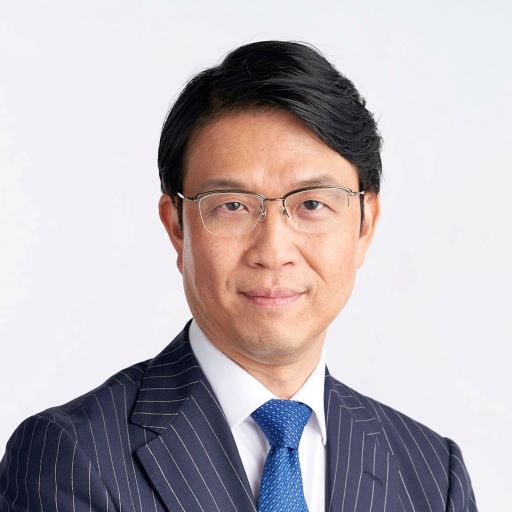


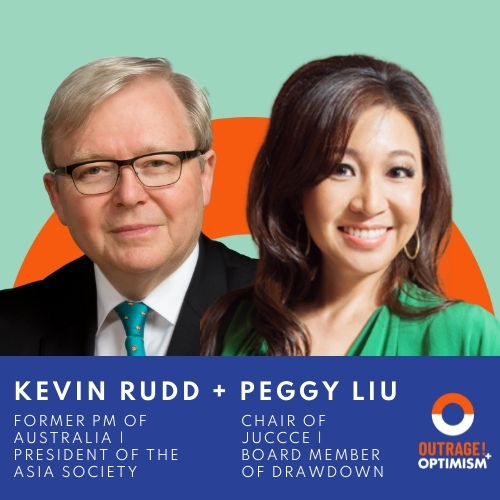
.jpg)
